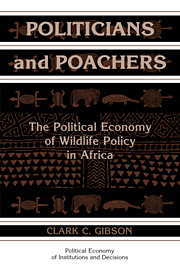Book contents
- Frontmatter
- Contents
- Series editor's preface
- Acknowledgments
- 1 Politics, Institutions, and Animals: Explaining the Content, Continuity, and Change of African Wildlife Policy
- I The National Politics of Wildlife Policy
- 2 Unkept Promises and Party Largesse: The Politics of Wildlife in the Independence Period
- 3 The Political Logic of Poaching in One-Party States
- II The Bureaucratic Politics of Wildlife Policy
- III The Local Politics of Wildlife Policy
- Notes
- Bibliography
- Index
3 - The Political Logic of Poaching in One-Party States
Published online by Cambridge University Press: 02 December 2009
- Frontmatter
- Contents
- Series editor's preface
- Acknowledgments
- 1 Politics, Institutions, and Animals: Explaining the Content, Continuity, and Change of African Wildlife Policy
- I The National Politics of Wildlife Policy
- 2 Unkept Promises and Party Largesse: The Politics of Wildlife in the Independence Period
- 3 The Political Logic of Poaching in One-Party States
- II The Bureaucratic Politics of Wildlife Policy
- III The Local Politics of Wildlife Policy
- Notes
- Bibliography
- Index
Summary
Mr. Speaker, when the registration of voters was taking place, I did not hear of any animal being asked to go and register as a voter; I heard the campaigners ask only human beings. Maybe the animals were asked in a different language.
The Honorable J. M. Kalenga, addressing the National Assembly, 10 December 1982The institutional environment of Zambia's First Republic did not last long. Threatened by the electoral gains of opposition parties, Kenneth Kaunda declared a one-party state in Zambia in 1972, concentrating power in the office of the president. Along with this dramatic change in political institutions, a fall in the price of copper significantly decreased the Zambian government's revenues in 1975. Subsequent government policies and a growing international demand for wildlife products increased wildlife's value for most Zambians, and a wave of poaching swept through the country.
Kaunda responded to the upsurge in poaching with a broad array of actions, including the introduction of stronger antipoaching legislation to the National Assembly. Unlike in Zambia's First Republic, however, President Kaunda faced active opposition to his wildlife policy during the early years of the Second Republic: Members of both the party and the government sabotaged his calls for stiffer penalties and broader regulation.
In this chapter, I explain how the incentives generated by the new political institutions encouraged politicians to oppose Kaunda's preferred wildlife policy.
- Type
- Chapter
- Information
- Politicians and PoachersThe Political Economy of Wildlife Policy in Africa, pp. 49 - 80Publisher: Cambridge University PressPrint publication year: 1999



